Sir John Monash, Personal Files Book 13, 1 June - 1 July 1916, Part 1
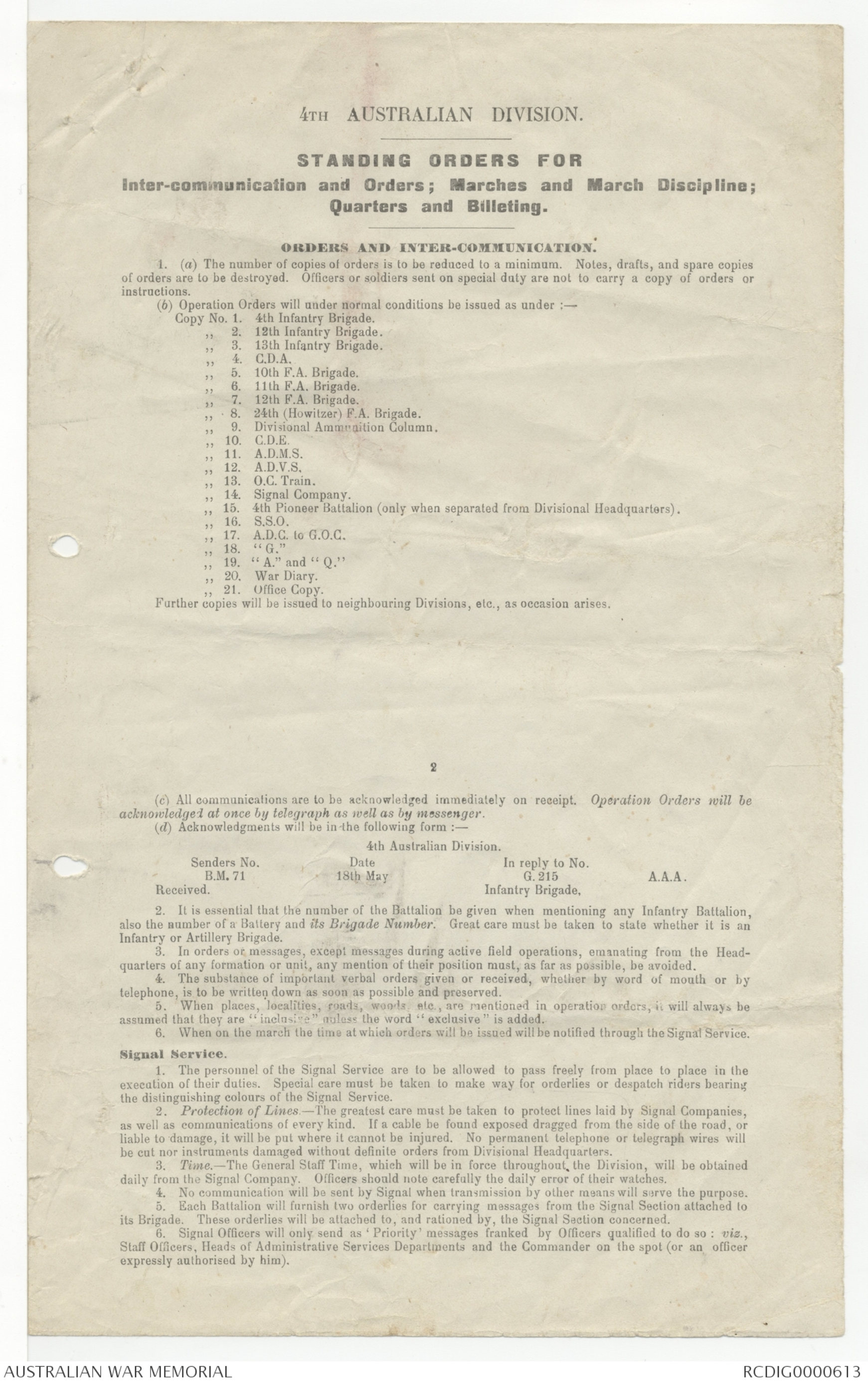
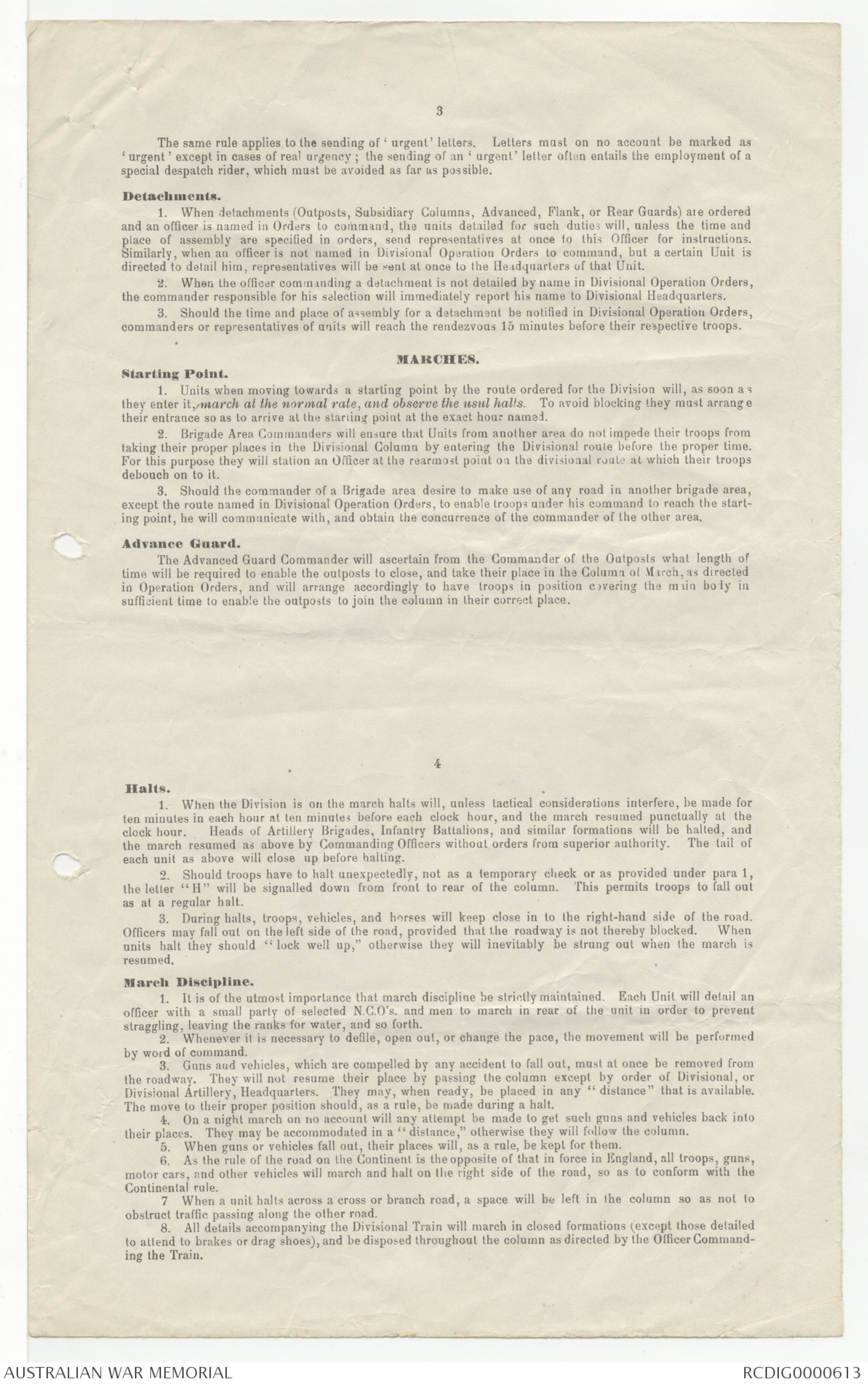
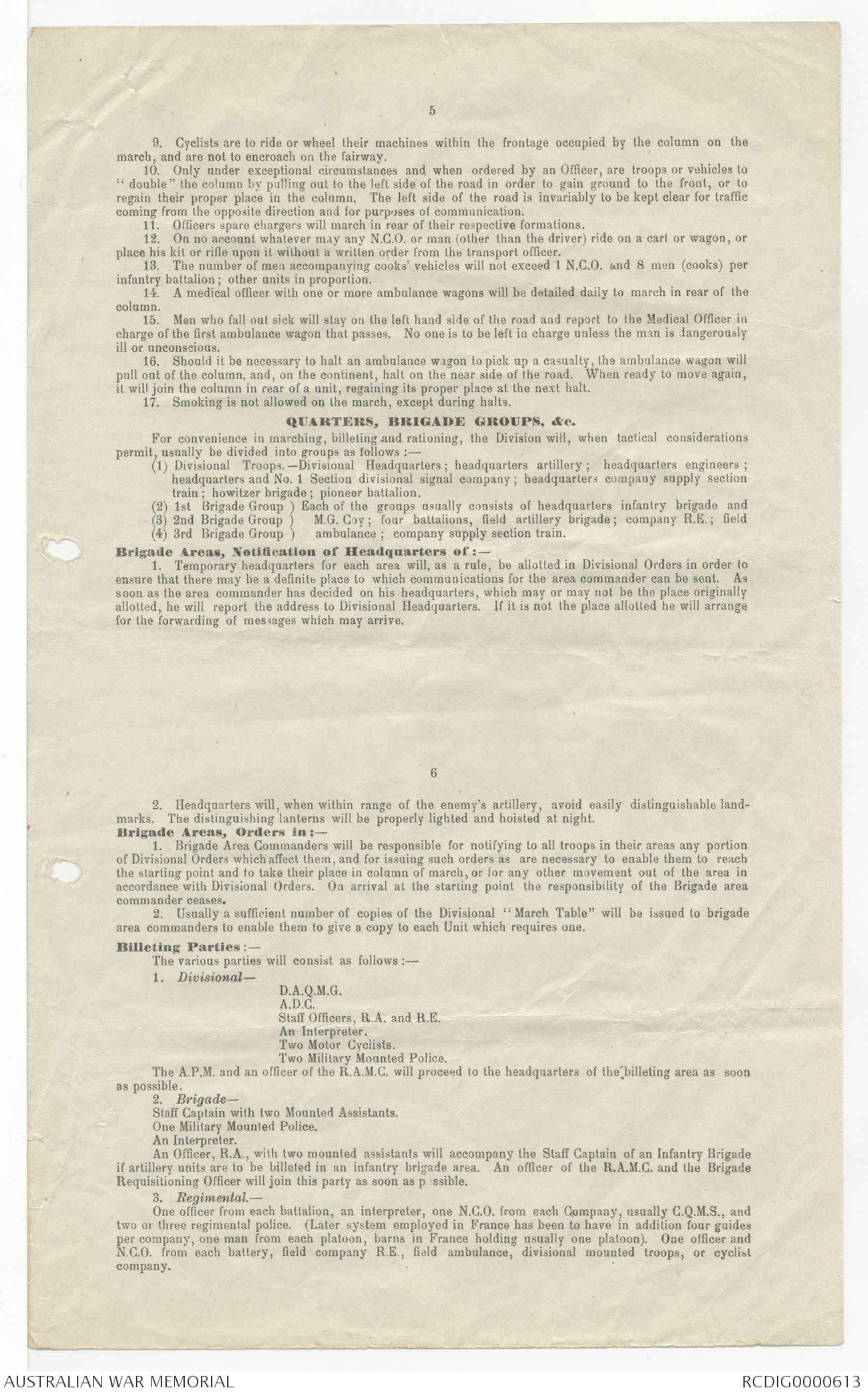
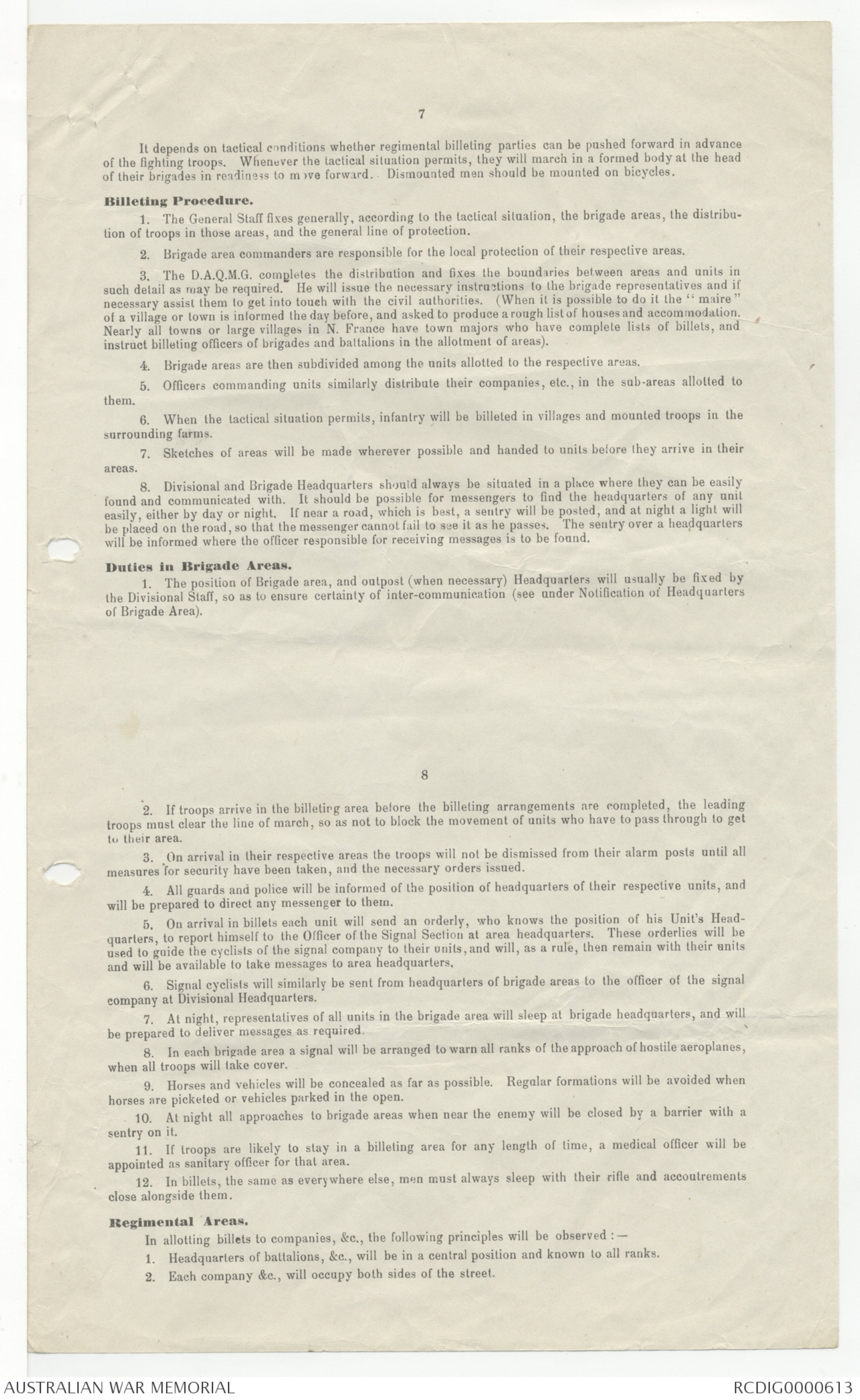
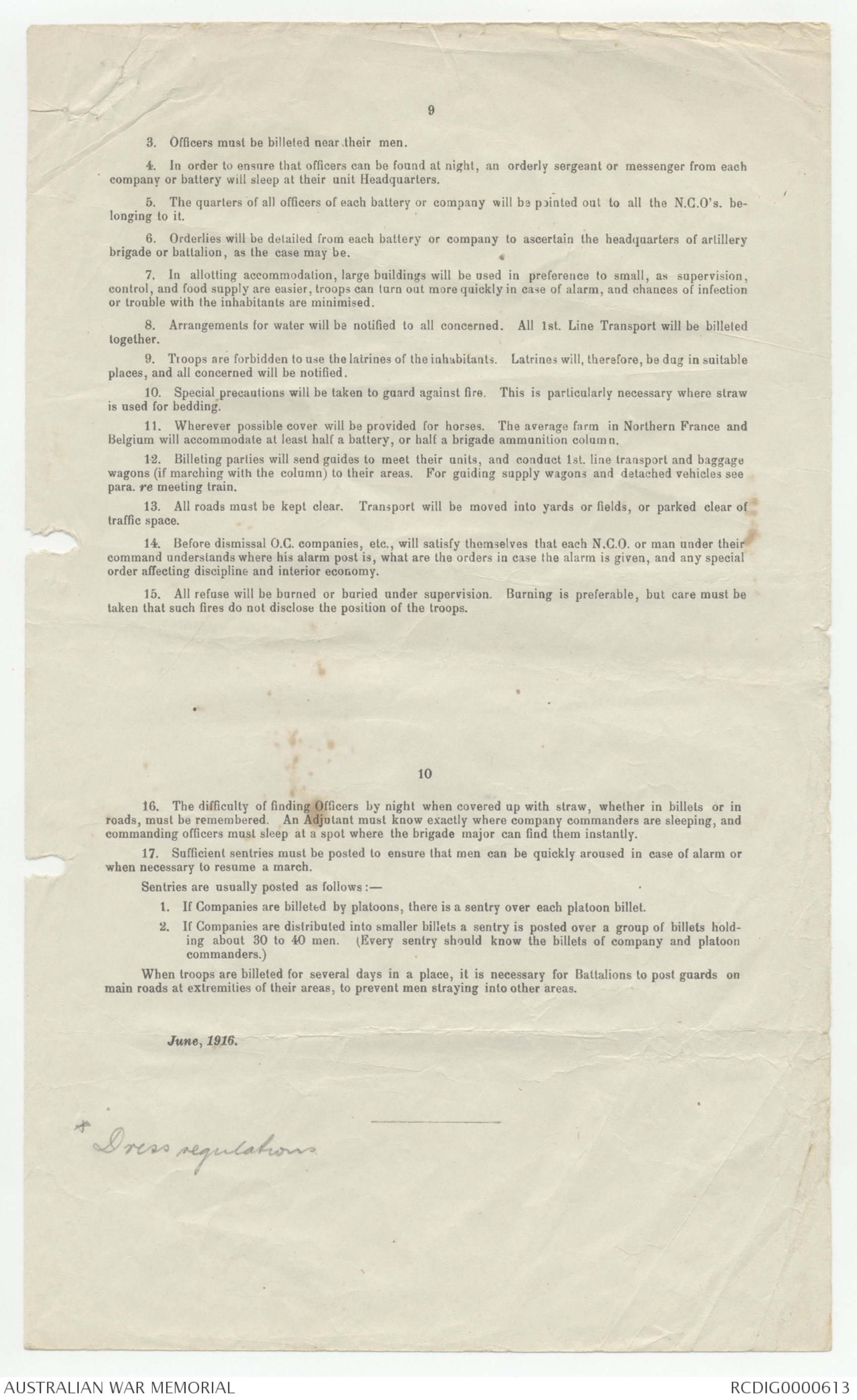
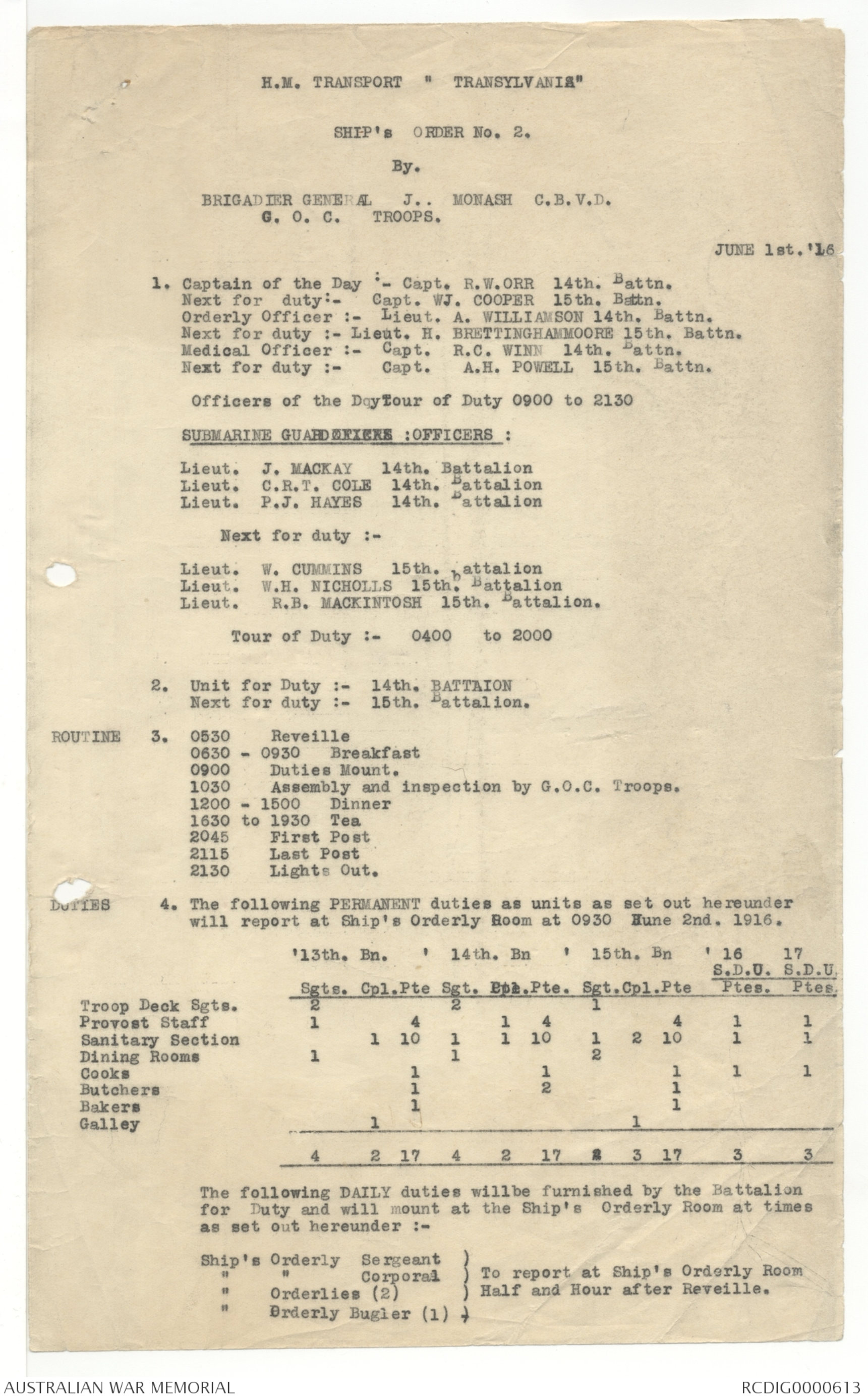
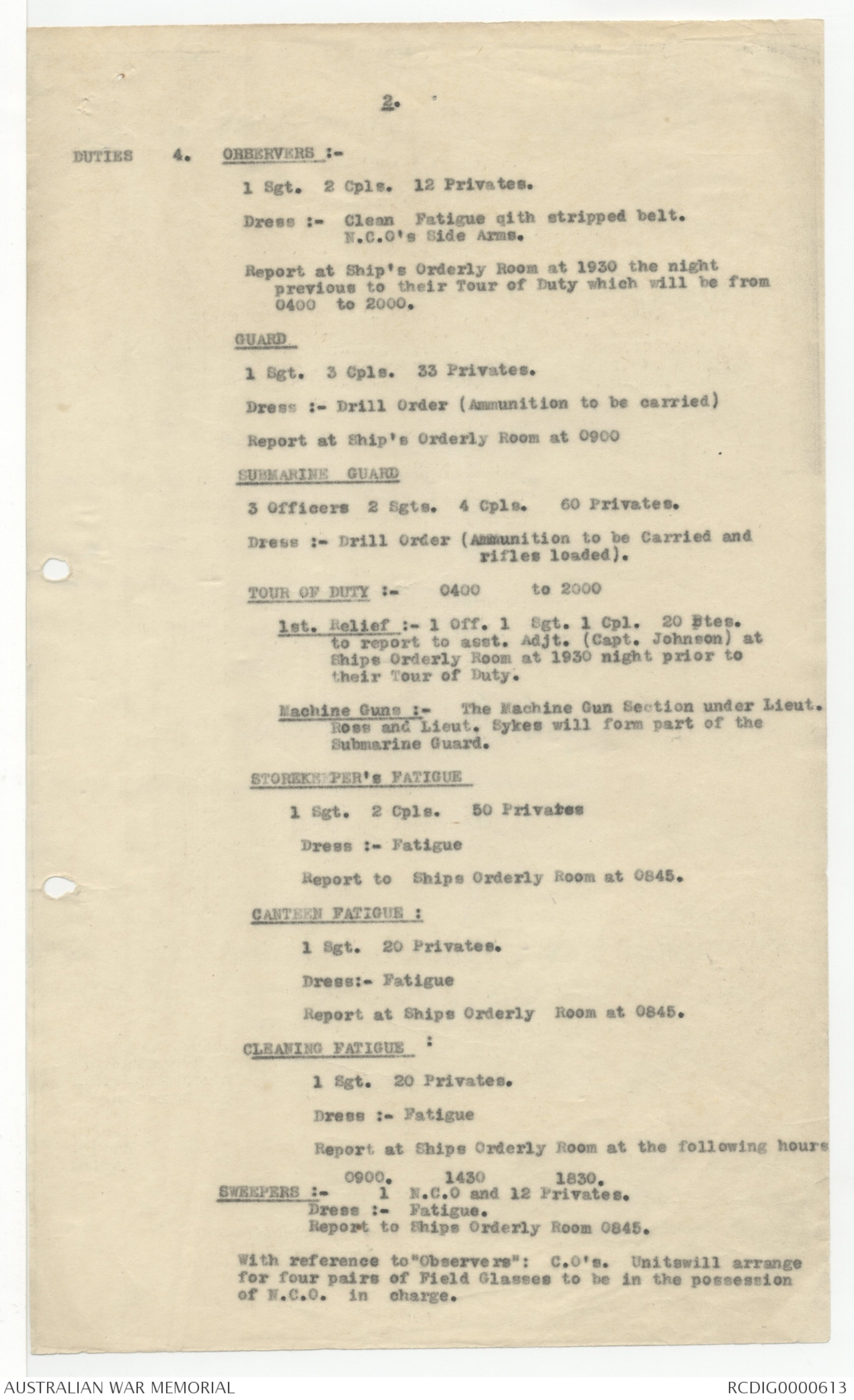
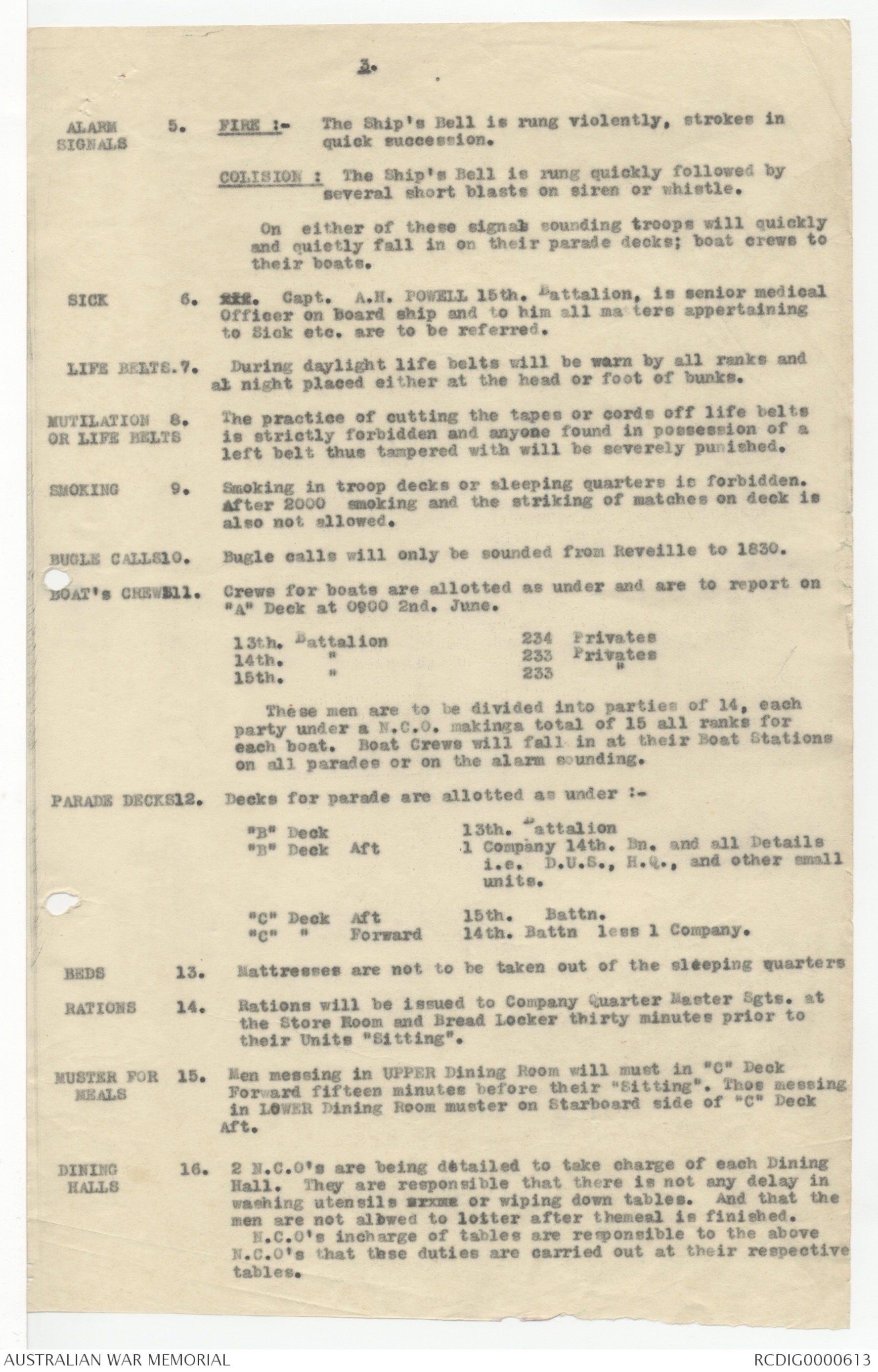
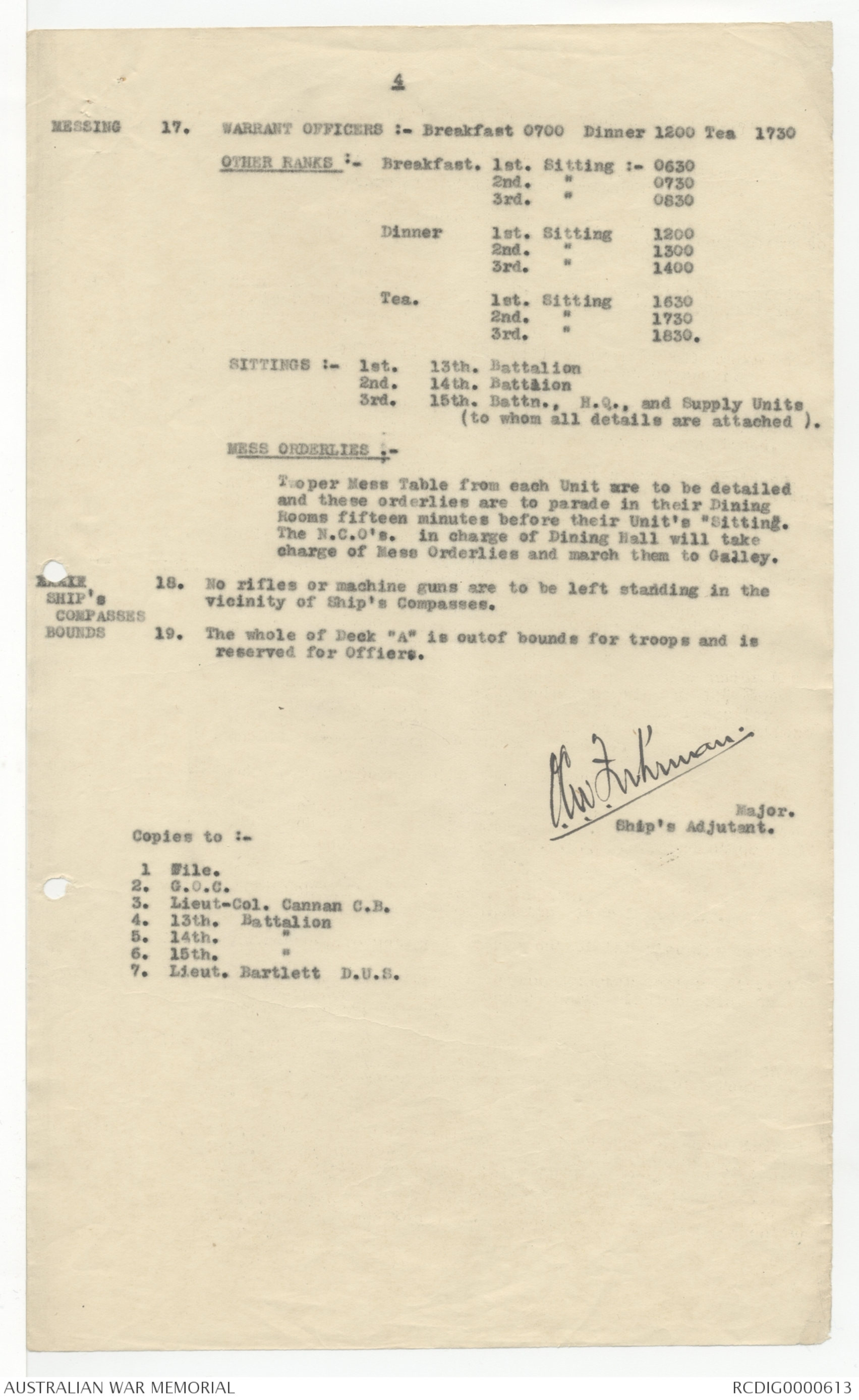
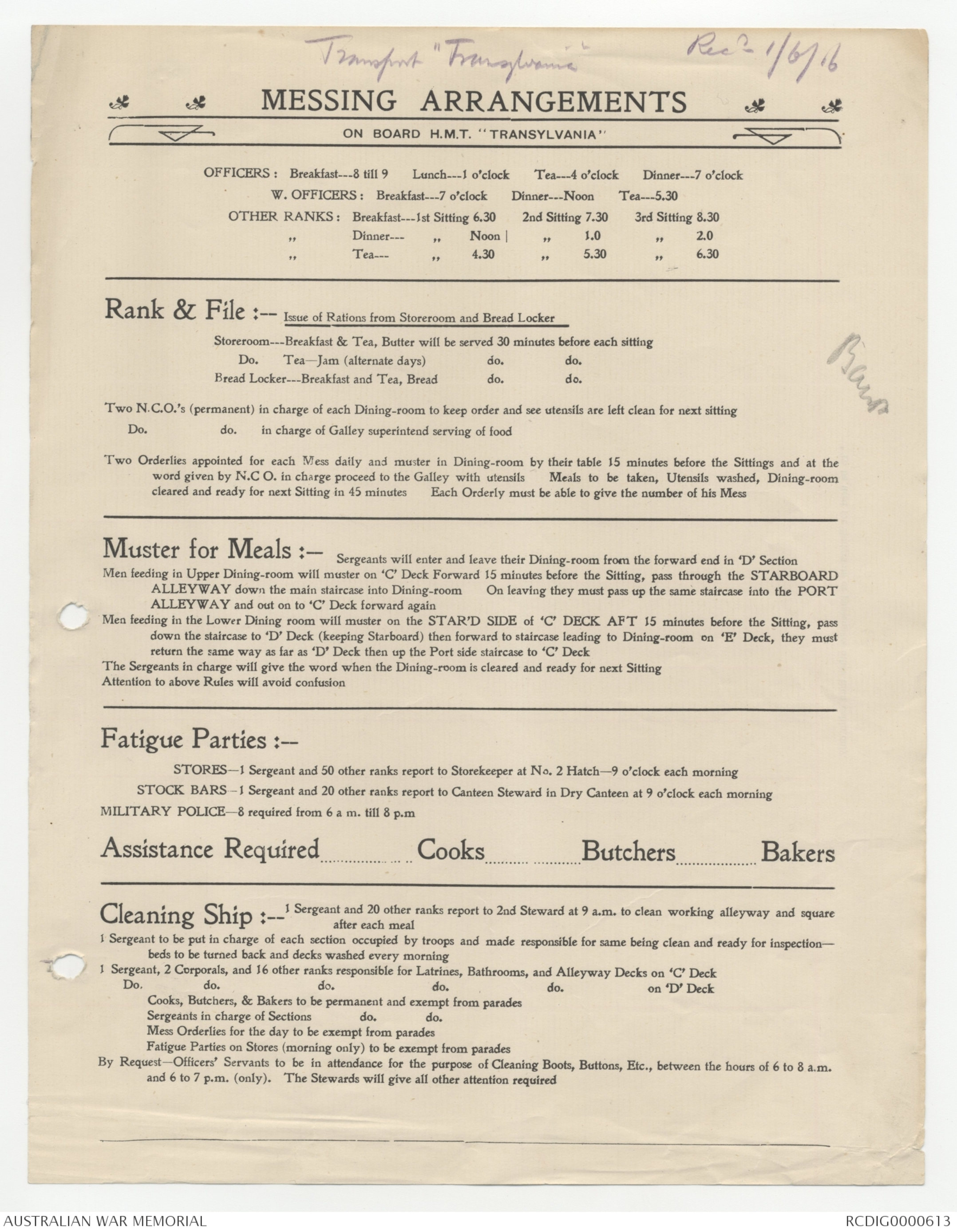
4TH AUSTRALIAN DIVISION.
STANDING ORDERS FOR
Inter-communication and Orders; Marches and March Discipline;
Quarters and Billeting.
ORDERS AND INTER-COMMUNICATION.
1.(a) The number of copies of orders is to be reduced to a minimum. Notes, drafts, and spare copies of orders are to be destroyed. Officers or soldiers sent on special duty are not to carry a copy of orders or
instructions.
(b) Operation Orders will under normal conditions be issued as under:-
Copy No. 1. 4th Infantry Brigade.
" 2. 12th Infantry Brigade.
" 3. 13th Infantry Brigade.
" 4. C.D.A
" 5. 1Oth F.A Brigade.
" 6. 11th F.A. Brigade.
" 7. 12th F.A Brigade
" 8. 24th (Howitzer) F.A. Brigade.
" 9. Divisional Ammunition Column.
" 10. CDE
" 11. A.D.MS.
" 12. A.D.V.S.
" 13. O.C. Train.
" 14. Signal Company.
" 15. 4th Pioneer Battalion (only when separated from Divisional Headquarters).
" 16. S.S.O.
" 17. A.D.C. to G.O.C.
" 18. "G."
" 19. "A." and "Q."
" 20. War Diary.
" 21. Office Copy.
Further copies will be issued to neighbouring Divisions, etc., as occasion arises.
2
(c) All communications are to be acknowledged immediately on receipt. Operation Orders will be acknowledged at once by telegraph as well as by messenger.
(d) Acknowledgments will be in the following form:-
4th Australian Division.
Senders No. Date In reply to No.
B.M. 71 18th May G. 215 A.A.A.
Received. Infantry Brigade.
2. It is essential that the number of the Battalion be given when mentioning any Infantry Battalion,
also the number of a Battery and its Brigade Number. Great care must be taken to state whether it is an
Infantry or Artillery Brigade.
3. In orders of messages, except messages during active field operations, emanating from the Headquarters
of any formation or unit, any mention of their position must, as far as possible, be avoided.
4. The substance of important verbal orders given or received, whether by word of mouth or by
telephone, is to be written down as soon as possible and preserved.
5. When places, localities, roads, woods, etc., are mentioned in operation orders, it will always be
assumed that they are "inclusive" unless the word "exclusive" is added.
6. When on the march the time at which orders will be issued will be notified through the Signal Service.
Signal Service.
1. The personnel of the Signal Service are to be allowed to pass freely from place to place in the
execution of their duties. Special care must be taken to make way for orderlies or despatch riders bearing
the distinguishing colours of the Signal Service.
2. Protection of Lines --The greatest care must be taken to protect lines laid by Signal Companies,
as well as communications of every kind. If a cable be found exposed dragged from the side of the road, or
liable to damage, it will be put where it cannot be injured. No permanent telephone or telegraph wires will
be cut nor instruments damaged without definite orders from Divisional Headquarters.
3. Time — The General Staff Time, which will be in force throughout the Division, will be obtained
daily from the Signal Company. Officers should note carefully the daily error of their watches.
4 No communication will be sent by Signal when transmission by other means will serve the purpose.
5. Each Battalion will furnish two orderlies for carrying messages from the Signal Section attached to
its Brigade. These orderlies will be attached to, and rationed by, the Signal Section concerned.
6. Signal Officers will only send as 'Priority' messages franked by Officers qualified to do so: viz.,
Staff Officers, Heads of Administrative Services Departments and the Commander on the spot (or an officer
expressly authorised by him).
3
The same rule applies to the sending of 'urgent' letters. Letters must on no account be marked as
'urgent' except in cases of real urgency; the sending of an 'urgent' letter often entails the employment of a
special despatch rider, which must be avoided as far as possible.
Detachments.
1. When detachments (Outposts, Subsidiary Columns, Advanced, Flank, or Rear Guards) are ordered
and an officer is named in Orders to command, the units detailed for such duties will, unless the time and place of assembly are specified in orders, send representatives at once to this Officer for instructions.
Similarly, when an officer is not named in Divisional Operation Orders to command, but a certain Unit is directed to detail him, representatives will be sent at once to the Headquarters of that Unit.
2. When the officer commanding a detachment is not detailed by name in Divisional Operation Orders, the commander responsible for his selection will immediately report his name to Divisional Headquarters.
3. Should the time and place of assembly for a detachment be notified in Divisional Operation Orders, commanders or representatives of units will reach the rendezvous 15 minutes before their respective troops.
MARCHES.
Starting Point.
1. Units when moving towards a starting point by the route ordered for the Division will, as soon as
they enter it, march at the normal rate, and observe the usual halts. To avoid blocking they must arrange
their entrance so as to arrive at the starling point at the exact hour named.
2. Brigade Area Commanders will ensure that Units from another area do not impede their troops from
taking their proper places in the Divisional Column by entering the Divisional route before the proper time.
For this purpose they will station an Officer at the rearmost point on the divisional route at which their troops
debouch on to it.
3. Should the commander of a Brigade area desire to make use of any road in another brigade area,
except the route named in Divisional Operation Orders, to enable troops under his command to reach the starting
point, he will communicate with, and obtain the concurrence of the commander of the other area.
Advance Guard.
The Advanced Guard Commander will ascertain from the Commander of the Outposts what length of
time will be required to enable the outposts to close, and take their place in the Column of March, as directed
in Operation Orders, and will arrange accordingly to have troops in position covering the main body in
sufficient time to enable the outposts to join the column in their correct place.
4.
Halts.
1. When the Division is on the march halts will, unless tactical considerations interfere, be made for
ten minutes in each hour at ten minutes before each clock hour, and the march resumed punctually at the
clock hour. Heads of Artillery Brigades, Infantry Battalions, and similar formations will be halted, and
the march resumed as above by Commanding Officers without orders from superior authority. The tail of
each unit as above will close up before halting.
2. Should troops have to halt unexpectedly, not as a temporary check or as provided under para 1,
the letter "H" will be signalled down from front to rear of the column. This permits troops to fall out
as at a regular halt.
3. During halts, troops, vehicles, and horses will keep close in to the right-hand side of the road.
Officers may fall out on the left side of the road, provided that the roadway is not thereby blocked. When
units halt they should "lock well up," otherwise they will inevitably be strung out when the march is
resumed.
March Discipline.
1. It is of the utmost importance that march discipline be strictly maintained. Each Unit will detail an
officer with a small party of selected N.C.O.'s. and men to march in rear of the unit in order to prevent
straggling, leaving the ranks for water, and so forth
2. Whenever it is necessary to defile, open out, or change the pace, the movement will be performed
by word of command.
3. Guns and vehicles, which are compelled by any accident to fall out, must at once be removed from
the roadway. They will not resume their place by passing the column except by order of Divisional, or
Divisional Artillery Headquarters. They may, when ready, be placed in any "distance" that is available.
The move to their proper position should, as a rule, be made during a halt.
4. On a night march on no account will any attempt be made to get such guns and vehicles back into
their places. They may be accommodated in a "distance," otherwise they will follow the column.
5. When guns or vehicles fall out, their places will, as a rule, be kept for them.
6. As the rule of the road on the Continent is the opposite of that in force in England, all troops, guns,
motor cars, and other vehicles will march and halt on the right side of the road, so as to conform with the
Continental rule.
7. When a unit halts across a cross or branch road, a space will be left in the column so as not to
obstruct traffic passing along the other road.
8. All details accompanying the Divisional Train will march in closed formations (except those detailed
to attend to brakes or drag shoes), and be disposed throughout the column as directed by the Officer Commanding
the Train.
5
9. Cyclists are to ride or wheel their machines within the frontage occupied by the column on the
march, and are not to encroach on the fairway.
10. Only under exceptional circumstances and when ordered by an Officer, are troops or vehicles to
"double" the column by pulling out to the left side of the road in order to gain ground to the front, or to
regain their proper place in the column. The left side of the road is invariably to be kept clear for traffic
coming from the opposite direction and for purposes of communication.
11. Officers spare chargers will march in rear of their respective formations.
12. On no account whatever may any N.C.O. or man (other than the driver) ride on a card or wagon, or
place his kit or ride upon it without a written order from the transport officer.
13. The number of men accompanying cooks' vehicles will not exceed 1 N.C.O. and 8 men (cooks) per
infantry battalion; other units in proportion.
14. A medical officer with one or more ambulance wagons will be detailed dally to march in rear of the
column.
15. Men who fall out sick will stay on the left hand side of the road and report to the Medical Officer in
charge of the first ambulance wagon that passes. No one is to be left in charge unless the man is dangerously
ill or unconscious.
16. Should it be necessary to halt an ambulance wagon to pick up a casualty, the ambulance wagon will
pull out of the column, and, on the continent, halt on the near side of the road. When ready to move again,
it will join the column in rear of a unit, regaining its proper place at the next halt.
17. Smoking is not allowed on the march, except during halts.
QUARTERS, BRIGADE GROUPS, &c.
For convenience in marching, billeting and rationing, the Division will, when tactical considerations
permit, usually be divided into groups as follows:-
(1) Divisional Troops. - Divisional Headquarters; headquarters artillery; headquarters engineers;
headquarters and No. 1 Section divisional signal company; headquarters company supply section
train; howitzer brigade; pioneer battalion.
(2) 1st Brigade Group ) Each of the groups usually consists of headquarters infantry brigade and
(3) 2nd Brigade Group ) M.G. Coy; four battalions, field artillery brigade; company R.E.; field
(4) 3rd Brigade Group) ambulance; company supply section train.
Brigade Areas, Notification of Headquarters of:-
1. Temporary headquarters for each area will, as a rule, be allotted in Divisional Orders in order to
ensure that there may be a definite place to which communications for the area commander can be sent. As
soon as the area commander has decided on his headquarters, which may or may not be the place originally
allotted, he will report the address to Divisional Headquarters. If it is not the place allotted he will arrange
for the forwarding of messages which may arrive.
6
2. Headquarters will, when within range of the enemy's artillery, avoid easily distinguishable landmarks.
The distinguishing lanterns will be properly lighted and hoisted at night.
Brigade Areas, Orders in;-
1. Brigade Area Commanders will be responsible for notifying to all troops in their areas any portion
of Divisional Orders which affect them, and for issuing such orders as are necessary to enable them to reach
the starting point and to take their place in column of march, or for any other movement out of the area in
accordance with Divisional Orders. On arrival at the starting point the responsibility of the Brigade area
commander ceases.
2. Usually a sufficient number of copies of the Divisional "March Table" will be issued to brigade
area commanders to enable them to give a copy to each Unit which requires one.
Billeting Parties:
The various parties will consist as follows:—
1. Divisional-
D.A.Q.M.G.
A.D.C.
Staff Officers, R.A. and R.E.
An Interpreter.
Two Motor Cyclists.
Two Military Mounted Police.
The A.P.M and an officer of the R.A.M.C. will proceed to the headquarters of the billeting area as soon
as possible.
2. Brigade -
Staff Captain with two Mounted Assistants.
One Military Mounted Police.
An Interpreter.
An Officer, R.A, with two mounted assistants will accompany the Staff Captain of an Infantry Brigade
if artillery units are to be billeted in an infantry brigade area. An officer of the R.A.M.C. and the Brigade
Requisitioning Officer will join this party as soon as possible.
3. Regimental.-
One officer from each battalion, an interpreter, one N.C.O. from each Company, usually C.Q.M.S., and
two or three regimental police. (Later system employed in France has been to have in addition four guides
per company, one man from each platoon, barns in France holding usually one platoon) One officer and
NCO. from each battery, field company R.E., field ambulance, divisional mounted troops, or cyclist
company.
7
It depends on tactical conditions whether regimental billeting parties can be pushed forward in advance
of the fighting troops. Whenever the tactical situation permits, they will march in a formed body at the head
of their brigades in readiness to move forward. Dismounted men should be mounted on bicycles.
Billeting Procedure.
1. The General Staff fixes generally, according to the tactical situation, the brigade areas, the distributon
of troops in those areas, and the general line of protection.
2. Brigade area commanders are responsible for the local protection of their respective areas.
3. The D.A.Q.M.G. completes the distribution and fixes the boundaries between areas and units in
such detail as may be required. He will issue the necessary instructions to the brigade representatives and if
necessary assist them to get into touch with the civil authorities. (When it is possible to do it the "maire"
of a village or town is informed the day before, and asked to produce a rough list of houses and accommodation.
Nearly all towns or large villages in N. France have town majors who have complete lists of billets, and
instruct billeting officers of brigades and battalions in the allotment of areas).
4. Brigade areas are then subdivided among the units allotted to the respective areas.
5. Officers commanding units similarly distribute their companies, etc., in the sub-areas allotted to
them.
6. When the tactical situation permits, infantry will be billeted in villages and mounted troops in the
surrounding farms.
7. Sketches of areas will be made wherever possible and handed to units before they arrive in their
areas.
8. Divisional and Brigade Headquarters should always be situated in a place where they can be easily
found and communicated with. It should be possible for messengers to find the headquarters of any unit
easily, either by day or night. If near a road, which is best, a sentry will be posted, and at night a light will
be placed on the road, so that the messenger cannot fail to see it as he passes. The sentry over a headquarters
will be informed where the officer responsible for receiving messages is to be found.
Duties in Brigade Areas.
1. The position of Brigade area, and outpost (when necessary) Headquarters will usually be fixed by
the Divisional Staff, so as to ensure certainty of inter-communication (see under Notification of Headquarters
of Brigade Area).
8
2. If troops arrive in the billeting area before the billeting arrangements are completed, the leading
troops must clear the line of march, so as not to block the movement of units who have to pass through to get
to their area.
3. On arrival in their respective areas the troops will not be dismissed from their alarm posts until all
measures for security have been taken, and the necessary orders issued.
4. All guards and police will be informed of the position of headquarters of their respective units, and
will be prepared to direct any messenger to them.
5. On arrival in billets each unit will send an orderly, who knows the position of his Unit's Headquarters,
to report himself to the Officer of the Signal Section at area headquarters. These orderlies will be
used to guide the cyclists of the signal company to their units, and will, as a rule, then remain with their units
and will be available to take messages to area headquarters,
6. Signal cyclists will similarly be sent from headquarters of brigade areas to the officer of the signal
company at Divisional Headquarters.
7. At night, representatives of all units in the brigade area will sleep at brigade headquarters, and will
be prepared to deliver messages as required.
8. In each brigade area a signal will be arranged to warn all ranks of the approach of hostile aeroplanes,
when all troops will take cover.
9. Horses and vehicles will be concealed as far as possible. Regular formations will be avoided when
horses are picketed or vehicles parked in the open.
10. At night all approaches to brigade areas when near the enemy will be closed by a barrier with a
sentry on it.
11. If troops are likely to stay in a billeting area for any length of time, a medical officer will be
appointed as sanitary officer for that area.
12. In billets, the same as everywhere else, men must always sleep with their rifle and accoutrements
close alongside them.
Regimental Areas.
In allotting billets to companies, &c., the following principles will be observed:-
1. Headquarters of battalions, &c., will be in a central position and known to all ranks.
2. Each company &c., will occupy both sides of the street.
9
3. Officers must be billeted near their men.
4. In order to ensure that officers can be found at night, an orderly sergeant or messenger from each
company or battery will sleep at their unit Headquarters.
5. The quarters of all officers of each battery or company will be pointed out to all the N.C.O's. belonging
to it.
6. Orderlies will be detailed from each battery or company to ascertain the headquarters of artillery
brigade or battalion, as the case may be.
7. In allotting accommodation, large buildings will be used in preference to small, as supervision,
control, and food supply are easier, troops can turn out more quickly in case of alarm, and chances of infection
or trouble with the inhabitants are minimised.
8. Arrangements for water will be notified to all concerned. All 1st. Line Transport will be billeted
together.
9. Troops are forbidden to use the latrines of the inhabitants. Latrines will, therefore, be dug in suitable
places, and all concerned will be notified.
10. Special precautions will be taken to guard against fire. This is particularly necessary where straw
is used for bedding.
11. Wherever possible cover will be provided for horses. The average farm in Northern France and
Belgium will accommodate at least half a battery, or half a brigade ammunition column.
12. Billeting parties will send guides to meet their units, and conduct 1st line transport and baggage
wagons (if marching with the column) to their areas. For guiding supply wagons and detached vehicles see
para. re meeting train.
13. All roads must be kept clear. Transport will be moved into yards or fields, or parked clear of
traffic space.
14. Before dismissal O.C. companies, etc., will satisfy themselves that each N.CO or man under their
command understands where his alarm post is, what are the orders in case the alarm is given, and any special
order affecting discipline and interior economy.
15. All refuse will be burned or buried under supervision. Burning is preferable, but care must be
taken that such fires do not disclose the position of the troops.
10
16. The difficulty of finding Officers by night when covered up with straw, whether in billets or in
roads, must be remembered. An Adjutant must know exactly where company commanders are sleeping, and
commanding officers must sleep at a spot where the brigade major can find them instantly.
17. Sufficient sentries must be posted to ensure that men can be quickly aroused in case of alarm or
when necessary to resume a march.
Sentries are usually posted as follows:—
1. If Companies are billeted by platoons, there is a sentry over each platoon billet.
2. If Companies are distributed into smaller billets a sentry is posted over a group of billets holding
about 30 to 40 men. (Every sentry should know the billets of company and platoon
commanders.)
When troops are billeted for several days in a place, it is necessary for Battalions to post guards on
main roads at extremities of their areas, to prevent men straying into other areas.
June, 1916.
*Dress regulations
H.M. TRANSPORT. "TRANSYLVANIA"
SHIP's ORDER No. 2.
By.
BRIGADIER GENERAL J.. MONASH C.B.V.D.
G. O. C. TROOPS.
JUNE 1st.'16
1. Captain of the Day: - Capt. R.W.ORR 14th. Battn.
Next for duty:- Capt. WJ. COOPER 15th. Battn.
Orderly Officer : Lieut. A. WILLIAMSON 14th. Battn.
Next for duty :- Lieut. H. BRETTINGHAMMOORE 15th. Battn.
Medical Officer :- Capt. R.C. WINN 14th. Battn.
Next for duty :- Capt. A.H. POWELL 15th. Battn.
Officers of the DayTour of Duty 0900 to 2130
SUBMARINE GUARD XXXXX : OFFICERS :
Lieut. J. MACKAY 14th. Battalion
Lieut. C.R.T. COLE 14th. Battalion
Lieut. P.J. HAYES 14th. Battalion
Next for duty :-
Lieut. W. CUMMINS 15th. Battalion
Lieut. W.H. NICHOLLS 15th. Battalion
Lieut. R.B. MACKINTOSH 15th. Battalion.
Tour of Duty :- 0400 to 2000
2. Unit for Duty :- 14th. BATTAION
Next for duty :- 15th. Battalion.
ROUTINE 3. 0530 Reveille
0630 - 0930 Breakfast
0900 Duties Mount.
1030 Assembly and inspection by G.O.C. Troops.
1200 -1500 Dinner
1630 to 1930 Tea
2045 First Post
2115 Last Post
2130 Lights Out.
DUTIES 4. The following PERMANENT duties as units as set out hereunder
will report at Ship's Orderly Room at 0930 June 2nd. 1916.
| '13th. Bn | ' | 14th. Bn | ' | 15th. Bn | '16 | '17 | |||||
| S.D.U. | S.D.U. | ||||||||||
| Sgts. | Cpl. | Pte | Sgt. | Cpl. | Pte. | Sgt. | Cpl. | Pte | Ptes. | Ptes | |
| Troop Deck Sgts. |
2 |
|
|
2 |
|
|
1 |
|
|
|
|
| Provost Staff |
1 |
|
4 |
|
1 |
4 |
|
|
4 |
1 |
1 |
| Sanitary Section |
|
1 |
10 |
1 |
1 |
10 |
1 |
2 |
10 |
1 |
1 |
| Dining Rooms |
1 |
|
|
1 |
|
|
2 |
|
|
|
|
| Cooks |
|
|
1 |
|
|
1 |
|
|
1 |
1 |
1 |
| Butchers |
|
|
1 |
|
|
2 |
|
|
1 |
|
|
| Bakers |
|
|
1 |
|
|
|
|
|
1 |
|
|
| Galley |
|
1 |
|
|
|
|
|
1 |
|
|
|
|
4 |
2 |
17 |
4 |
2 |
17 |
4 |
3 |
17 |
3 |
3 |
The following DAILY duties will be furnished by the Battalion
for Duty and will mount at the Ship's Orderly Room at times
as set out hereunder :-
Ship's Orderly Sergeant )
" " Corporal ) To report at Ship's Orderly Room
" Orderlies (2) )Half and Hour after Reveille.
" Orderly Bugler (1))
2.
DUTIES 4. OBSERVERS: -
1 Sgt. 2 Cpls. 12 Privates.
Dress :- Clean Fatigue qith stripped belt.
N.C.O's Side Arms.
Report at Ship's Orderly Room at 1930 the night
previous to their Tour of Duty which will be from
0400 to 2000.
GUARD
1 Sgt. 3 Cpls. 33 Privates.
Dress :- Drill Order (Ammunition to be carried)
Report at Ship's Orderly Room at 0900
SUBMARINE GUARD
3 Officers 2 Sgts. 4 Cpls. 60 Privates.
Dress :- Drill Order (Ammunition to be Carried and
rifles loaded).
TOUR OF DUTY :- 0400 to 2000
1st. Relief :- 1 Off. 1 Sgt. 1 Cpl. 20 Ptes.
to report to asst. Adjt. (Capt. Johnson) at
Ships Orderly Room at 1930 might prior to
their Tour of Duty.
Machine Guns :-The Machine Gun Section under Lieut.
Ross and Lieut. Sykes will form part of the
Submarine Guard.
STOREKEEPER's FATIGUE
1 Sgt. 2 Cpls. 50 Privates
Dress :- Fatigue
Report to Ships Orderly Room at O845.
CANTEEN FATIGUE:
1 Sgt. 20 Privates.
Dress:- Fatigue
Report at Ships Orderly Room at O845.
CLEANING FATIGUE
1 Sgt. 20 Privates.
Dress :- Fatigue
Report at Ships Orderly Room at the following hours
0900. 1430 1830.
SWEEPERS: - 1 N.C.O and 12 Privates.
Dress: - Fatigue.
Report to Ships Orderly Room 0845.
With reference to "Observers": C.O's. Unitswill arrange
for four pairs of Field Glasses to be is the possession
of N.C.O. in charge.
ALARM SIGNALS 5 FIRE:- The Ship's Bell is rung violently, strokes in
quick succession.
COLISION: The Ship's Bell is rung quickly followed by
several short blasts on siren or whistle.
On either of these signals sounding troops will quickly
and quietly fall in on their parade decks; boat crews to
their boats.
SICK 6. xxx Capt. A.H. POWELL 15th. Battalion, is senior medical
Officer on Board ship and to him all matters appertaining
to Sick etc. are to be referred.
LIFE BELTS. 7. During daylight life belts will be warn by all ranks and
at night placed either at the head or foot of bunks.
MUTILATION OR LIFE BELTS 8. The practice of cutting the tapes or cords off life belts
is strictly forbidden and anyone found in possession of a
left belt thus tampered with will be severely punished.
SMOKING 9. Smoking in troop decks or sleeping quarters is forbidden.
After 2000 smoking and the striking of matches on deck is
also not allowed.
BUGLE CALLS 10. Bugle calls will only be sounded from Reveille to 1830.
BOAT's CREWS 11. Crews for boats are allotted as under and are to report on
"A" Deck at 0900 2nd. June.
13th. Battalion 234 Privates
14th. " 233 Privates
15th. " 233 "
These men are to be divided into parties of 14, each
party under a N.C.O. making a total of 15 all ranks for
each boat. Boat Crews will fall in at their Boat Stations
on all parades or on the alarm sounding.
PARADE DECKS 12. Decks for parade are allotted as under :-
"B" Deck 13th. Battalion
"B" Deck Aft 1 Company 14th. Bn. and all Details
i.e. D.U.S., H.Q., and other small
units.
"C" Deck Aft 15th. Battn.
"C" " Forward 14th Battn less 1 Company
BEDS 13. Mattresses are not to be taken out of the sleeping quarters
RATIONS 14. Rations will be issued to Company Quarter Master Sgts. at
the Store Room and Bread Locker thirty minutes prior to
their Units "Sitting".
MUSTER FOR MEALS 15. Men messing in UPPER Dining Room will must in "C' Deck
Forward fifteen minutes before their "Sitting". Thos messing
in LOWER Dining Room muster on Starboard side of "C' Deck
Aft.
DINING HALLS 16. 2 N.C.O's are being detailed to take charge of each Dining
Hall. They are responsible that there is not any delay in
washing utensils xxxxx or wiping down tables. And that the
men are not allowed to loiter after themeal is finished.
N.C.O's in charge of tables are responsible to the above
N.C.O's that these duties are carried out at their respective
tables.
4
MESSING 17. WARRANT OFFICERS :- Breakfast 0700 Dinner 1200 Tea 1730
OTHER RANKS:- Breakfast. 1st. Sitting:- 0630
2nd. " 0730
3rd. " 0830
Dinner 1st. Sitting 1200
2nd. " 1300
3rd. " 1400
Tea. 1st. Sitting 1630
2nd. " 1730
3rd. " 1830
SITTINGS :- 1st. 13th Battalion
2nd. 14th Battalion
3rd. 15th Battn., H.Q. and Supply Units
(to whom all details are attached)
MESS ORDERLIES:-
Two per Mess Table from each Unit are to be detailed
and these orderlies are to parade in their Dining
Rooms fifteen minutes before their Unit's "Sitting".
The N.C.O's in charge of Dining Hall will take
charge of Mess Orderlies and march them to Galley.MAIKE SHIP'S COMPASSES BOUNDS
18. No rifles or machine guns are to be left standing in the
vicinity of Ship's Compasses.
19. The whole of Deck "A" is out of bounds for troops and is
reserved for Officers.
OCW Fuhrman.
Major.
Ship's Adjutant
Copies to :-
1. File.
2. G.O.C.
3. Lieut-Col. Cannan C.B.
4. 13th. Battalion
5. 14th. "
6. 15th. "
7. Lieut. Bartlett D.U.S.
[*Transport "Transylvania
Rec 1/6/16*]
MESSING ARRANGEMENTS
ON BOARD H.M.T "TRANSYLVANIA"
OFFICERS: Breakfast--- 8 till 9 Lunch---- 1 o'clock Tea ---- 4 o'clock Dinner----7 o'clock
W. OFFICERS: Breakfast----7 o'clock Dinner ----Noon Tea---- 530
OTHER RANKS: Breakfast----1st Sitting 6.30 2nd Sitting 7.30 3rd Sitting 8.30
" Dinner---- " Noon | " 1.0 " 2.0
" Tea---- " 4.30 " 5.30 " 6.30
Rank & File:-- Issue of Rations from Storeroom and Bread Locker
Storeroom...Breakfast & Tea, Butter will be served 30 minutes before each sitting
Do. Tea---Jam (alternate days) do. do.
Bread Locker---Breakfast and Tea, Bread do. do.
Two N.C.O's (permanent in charge of each Dining-room, to keep order and see utensils are left clean for next sitting
Do. do. in charge of Galley superintend serving of food
Two Orderlies appointed for each Mess daily and muster in Dining-room by their table 15 minutes before the Sittings and at the
word given by N.C.O. in charge proceed to the Galley with utensils. Meals to be taken, Utensils washed, Dining-room
cleared and ready for next Sitting in 45 minutes. Each Orderly must be able to give the number of his Mess
Muster for Meals:- Sergeants will enter and leave their Dining-room from the forward end in 'D' Section
Men feeding in Upper Dining-room will muster on 'C' Deck Forward 15 minutes before the Sitting, pass through the STARBOARD
ALLEYWAY down the main staircase into Dining-room On leaving they must pass up the same staircase into the PORT
ALLEYWAY and out to 'C' Deck forward again
Men feeding in the Lower Dining room will muster on the STAR'D SIDE of 'C' DECK AFT 15 minutes before the Sitting, pass
down the staircase to 'D' Deck (keeping Starboard) then forward to staircase leading to Dining-room on 'E' Deck, they must
return the same way as far as 'D' Deck then up the Port side staircase to 'C' Deck
The Sergeants in charge will give the word when the Dining-room, is cleared and ready for the next Sitting
Attention to above Rules will avoid confusion
Fatigue Parties:-
STORES-- 1 Sergeant and 50 other ranks report to Storekeeper at No. 2 Hatch--9 o'clock each morning
STOCK BARS-- 1 Sergeant and 20 other ranks report to Canteen Steward in Dry Canteen at 9 o'clock each morning
MILITARY POLICE-- 8 required from 6 a m. till 8 p.m
Assistance Required...............Cooks............Butchers................Bakers
Cleaning Ship :-- 1 Sergeant and 20 other ranks report to 2nd Steward at 9.a.m. to clean working alleyway and square
after each meal
1 Sergeant to be put in charge of each section occupied by troops and made responsible for same being clean and ready for inspection -
beds to be turned back and decks washed every morning
1 Sergeant, 2 Corporals, and 16 other ranks responsible for Latrines, Bathrooms and Alleyway Decks on 'C' Deck
Do. do. do. do. do. on 'D' Deck
Cooks, Butchers, & Bakers to be permanent and exempt from parades
Sergeants in charge of Sections do. do.
Mess Orderlies for the day to be exempt from parades
Fatigue Parties on Stores (morning only) to be exempt from parades
By Request---Officers' servants to be in attendance for the purpose of Cleaning Boots, Buttons, Etc., between the hours of 6 to 8 a.m.
and 6 to 7 p.m. (only). he Stewards will give all other attention required
 Sandy Mudie
Sandy MudieThis transcription item is now locked to you for editing. To release the lock either Save your changes or Cancel.
This lock will be automatically released after 60 minutes of inactivity.